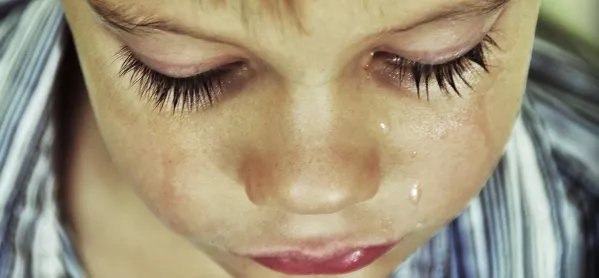Exclusion charter could expose pupils to ‘harassment’, says behaviour tsar

Councils pursuing behaviour policies aimed at stopping exclusions in schools risk ruining the life chances of other pupils, the government’s behaviour tsar has said.
Tom Bennett, a government adviser on behaviour, said a new charter introduced by Southwark Council in South London to minimise the number of exclusions could leave children exposed to “indignity and harassment”.
Southwark Council is asking schools to sign up to an inclusion charter where they pledge not to exclude, apart from cases where other pupils are at risk of harm.
Local secondary school heads who have yet to fully sign up to the charter have said they also want it to allow for exclusions in cases where the wellbeing and safety of staff is put at risk.
- Behaviour: One in 10 teachers ‘report being threatened with violence’
- Quick read: Behaviour boost claim ‘flimsy’, say teachers
- Revealed: The DfE’s 22 ‘lead’ Behaviour Hub schools
Teachers are also encouraged to take a “trauma-informed” approach to pupil behaviour in the new charter.
In the autumn 2021 term, there were no exclusions in Southwark schools, and the council has said it hopes it will be the first borough in England with zero exclusions in the coming years.
Mr Bennett told BBC Radio 4’s Today programme that the exclusion rate in Southwark had been lower than the national average since 2012, with one year that he described as an “outlier”.
A council report in July 2020 into exclusions found Southwark had “largely followed the national trend of rising exclusions, with rates of exclusion doubling since 2012-13”, and that as of 2017-18, its exclusion rates were above the London average, although lower than the average rate nationally.
Mr Bennett said: “What the charter clearly states is that for any behaviour short of the most extreme behaviours like knife crime and so on, this school should probably consider not excluding.
“That sounds fine in principle but there’s lots of misbehaviour short of criminality, which absolutely harrow and ruin the life chances of children in schools.
“All children have got the right to a safe, dignified learning, which is calm, and staff do too. Exclusions are a necessary part of that process.”
He said schools that choose not to exclude a pupil could expose other children to “days and days of indignity and harassment”.
Southwark councillor Jasmine Ali said that, in 2018, the borough had seen exclusions rising sharply, with 49 exclusions.
“Now that’s quite a lot of children,” she said.
She said the council subsequently formed a strategy with partners from the safeguarding board and schools, and that, currently, exclusion rates had already fallen to 10 children.
“I wouldn’t have thought this would have been so controversial,” she said, adding that the council’s aspiration is for “100 per cent inclusion of children in education that keeps them safe and enables them to flourish”.
Ms Ali said she was “disappointed” by Mr Bennett’s comments.
She suggested exclusions are akin to pressing a “nuclear button” and the council is providing wraparound support for vulnerable children to prevent this.
The charter commits to a multi-agency approach focused on early intervention with pupils.
Schools signing up to the charter must pledge not to “encourage parents to explore elective home education as a resolution to issues with inclusion” - widely seen as a form of off-rolling.
The charter says managed moves between schools may offer pupils a “fresh start”, but discussions about a possible move for a pupil must not take place informally.
It adds that it recognises “there are rare instances where exclusion is unavoidable to safeguard children”.
Local secondary heads want to amend exclusions charter
Southwark Association of Secondary Headteachers (SASH) have said that the charter does not advocate for a non-exclusion policy as it states there are ”rare instances where exclusion is unavoidable to safeguard children”.
However SASH members have said they want to extend this aspect of the Charter to include ”where the safety and well-being of staff is put at risk”.
They said this approach is in line with the Department for Education’s guidance on exclusions which comes into force from 1st September 2022.
In a statement they said: “Firstly, SASH members, in collaboration with other services that support children and their families such as Social Services, have been actively engaged in the process of drafting the Inclusion Charter during the past few months.
“Although there is a lot to commend in the Charter in its current form, SASH members are yet to be full signatories. We continue to work with LA representatives to ensure that the wording accurately reflects both the aspiration and the practice locally.
“Secondly, it is important to note that that the Inclusion Charter does not advocate for a ‘non-exclusion’ policy. The Charter explicitly states that there are ‘rare instances where exclusion is unavoidable to safeguard children’. SASH members agree with this position but would like to amend this aspect of the Charter to include ‘where the safety and well-being of staff is put at risk’.
“This approach is in line with the Department for Education’s guidance on exclusions which comes into force from 1st September 2022.
“SASH members are committed to inclusive education and have worked collaboratively as a group of schools to significantly reduce the number of permanent exclusions. We are proud of the education provided by our schools and continue to work positively and pro-actively with all relevant agencies to ensure that children in Southwark receive a first-class education.”
You need a Tes subscription to read this article
Subscribe now to read this article and get other subscriber-only content:
- Unlimited access to all Tes magazine content
- Exclusive subscriber-only stories
- Award-winning email newsletters
Already a subscriber? Log in
You need a subscription to read this article
Subscribe now to read this article and get other subscriber-only content, including:
- Unlimited access to all Tes magazine content
- Exclusive subscriber-only stories
- Award-winning email newsletters
topics in this article



